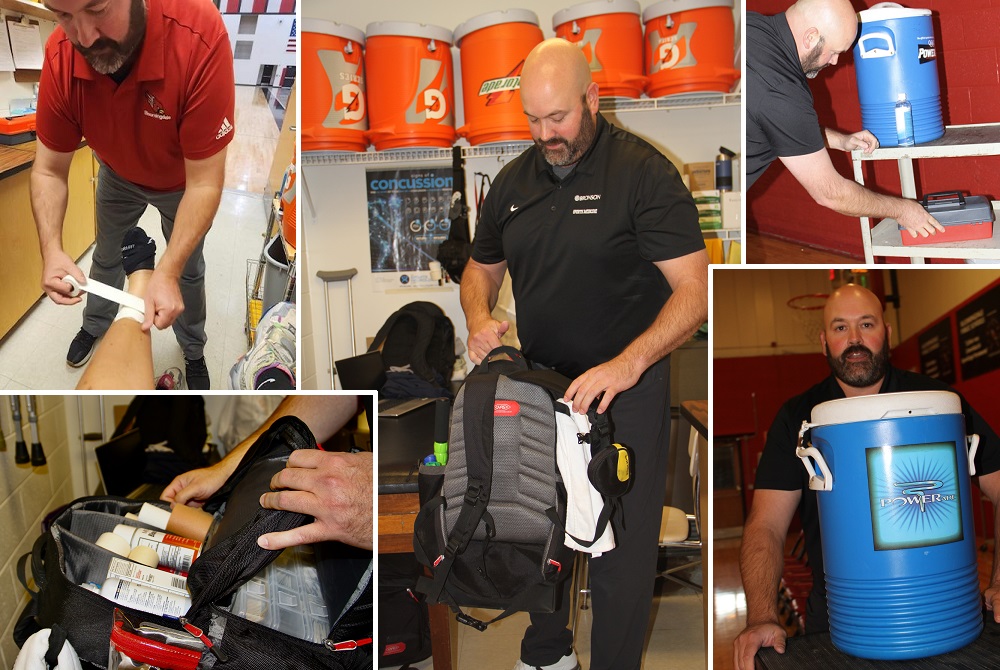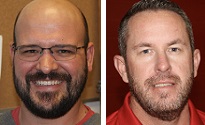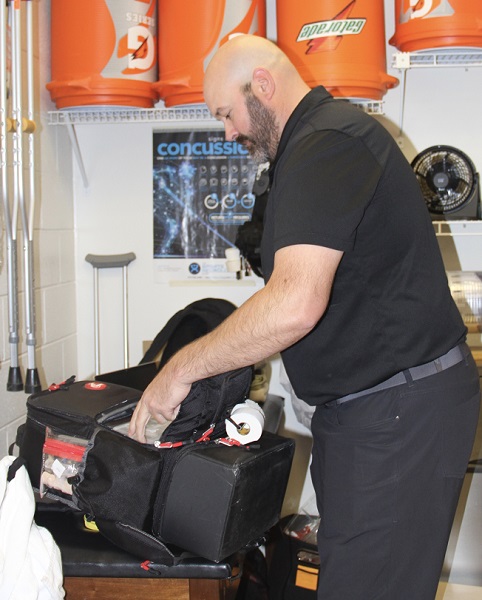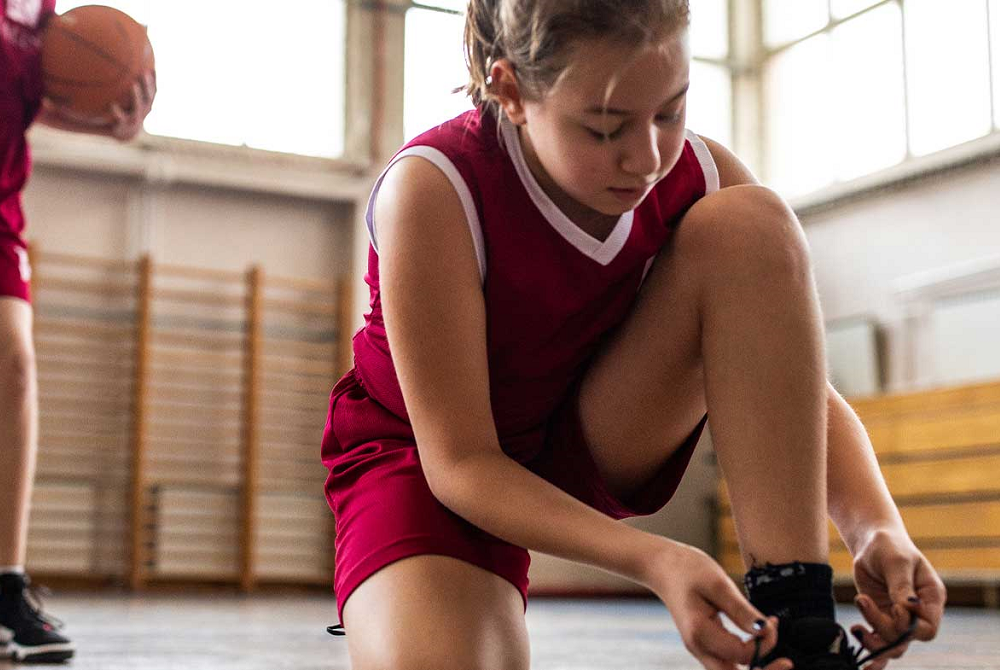
Bloomingdale Trainer Performing Invaluable Role in Keeping Athletes Playing
By
Pam Shebest
Special for MHSAA.com
November 22, 2022
BLOOMINGDALE — If Scott Allison looks bored during one of Bloomingdale’s sporting events, that is a good thing.
 “Trainers like to be behind the scenes and in the shadows,” the certified athletic trainer said. “We’re only needed in emergencies.
“Trainers like to be behind the scenes and in the shadows,” the certified athletic trainer said. “We’re only needed in emergencies.
“It’s one of those jobs that if we’re sitting around looking bored, then things are going well.”
But if an athlete goes down with an injury, Allison is quick to run onto the court or field.
In his first year at Bloomingdale, he has found that working with middle and high school students is a lot different than his previous work with the minor-league hockey Kalamazoo Wings.
Treating the hockey team, with whom he spent much of his 22 years, “There was a lot of traumatic stuff like lacerations or deep contusions, overuse injuries like hip flexors or core injuries or broken bones.
“Everything’s acute and fast. It’s a different animal. In hockey, they’re all pro athletes so they know their bodies really well.”
However, high school and middle school athletes are still in a growing phase.
“These kids don’t really know what’s going on a lot of times, so it’s a lot more education on what’s happening,” Allison said.
“Is it an injury, or is it just soreness? You get a lot of kids that don’t understand the difference between aches and pains or an injury. We see a lot of ankle sprains or shin splints because they’re just developing. They’re in that awkward range where their bodies try to grow too fast.”
 Allison is the Cardinals’ first certified athletic trainer, a new position for which athletic director Jason Hayes campaigned.
Allison is the Cardinals’ first certified athletic trainer, a new position for which athletic director Jason Hayes campaigned.
“What we notice is that if a kid’s injured, they’re out a lot less if you have a trainer because it speeds up recovery time,” said Hayes, who also coaches varsity football and is an assistant wrestling coach. “It’s like having a built-in physical therapist on your staff, too.”
Studies support Hayes’ statements.
According to information from The Sports Institute at University of Washington, “‘The athletic trainers know the athletes,” says Stan Herring, M.D., cofounder of The Sports Institute at (University of Washington) Medicine and a team physician for the Seattle Seahawks and Seattle Mariners. “They see the athletes frequently, if not every day. They know when something is wrong. They are medical professionals who evaluate, treat and rehabilitate athletes.’”
The article continued: “Three recent studies suggest that athletic trainers are linked to significant improvements in the diagnosis of concussion in young athletes and significant reductions in ‘time-loss’ injuries that require athletes to take time away from sports.”
Allison sees himself as a teacher as well as a trainer.
“We see a lot more strains or growth issues,” he said. “A lot of it is maintenance and teaching kids what’s going on with their bodies or what they need to do to change things.”
He also meets with parents and coaches to talk about the best way to prevent injuries.
Allison’s day begins about 1:30 or 2 p.m., giving athletes a chance to talk with him before practices or games.
During the action, he always has his first aid backpack filled with the basics: air splints for fractures or dislocations, AED, EpiPens, and bench kits (with taping and bandaging supplies, splints, gauze, ACE wraps, ice bags, latex gloves and other basic first aid supplies.)
He travels with the teams when they are involved in high-impact sports, such as football, and many times he is also called to treat an opposing player if that team has no trainer.
 Allison is a perfect fit with Bloomingdale, Hayes said.
Allison is a perfect fit with Bloomingdale, Hayes said.
His wife, Kirsten, coached the Cardinals girls basketball team for seven years. His daughter Emma, now at Glen Oaks Community College, graduated from there, and his daughter Bailey is an eighth grader.
“We are a very lucky town,” Hayes said. “We had Doc (Robert) Stevens, who had been volunteering as our athletic trainer for 15 years. He’s just aging out.
“About a year ago, he came to me and said that it was his last year. Scott has 22 years experience, and he has relationships here. To me, it was a no-brainer.”
Assistant varsity football coach Lance Flynn, who also coaches the middle school football team, saw Allison in action during competition in the fall.
“First quarter in a middle school football game, a kid broke his arm,” Flynn said. “My own son, Ryder, was on the varsity team and he sprained his AC socket and Scott took care of him.
“If something happens during a game, they can go see him and I don’t have to worry much because I know they’re in good hands.”
Allison’s affiliation with Bronson Sports Medicine is also a plus, the trainer said.
“With Bronson, we can offer a lot more and expedite getting in to see doctors or specialists if we need to,” he said. “We’re on the same system as the doctors, so we can diagnose and send notes to the doctors and they can send notes back to us.
“If there’s anybody we need to keep track of with the doctors, I can talk with the doctors and figure out how that’s going. If anybody needs to see me, they know I’m here early if they just want to come down to talk.”
Bronson also provides certified athletic trainers at 21 other southwest Michigan high schools: Brooke Vandepolder (Battle Creek Central), Lindsay Aarseth-Lindhorst (Climax-Scotts), Amanda Monsivaes (Comstock), Makenzie Hodgson (Delton Kellogg), Salvador Robles-Soriano (Gobles), Holly Ives (Richland Gull Lake), Katelyn Baker-Contreras (Kalamazoo Hackett Catholic Prep), Lizzy Smith (Kalamazoo Central), Emma Beener (Kalamazoo Christian), Holly Sisson (Kalamazoo Loy Norrix), Nico Talentino (Mattawan), Aaron Eickhoff (Otsego), Quincey Powell (Parchment), Malorie Most (Paw Paw), Jessica Bakhuyzen (Plainwell), Lance LeTourneau (Portage Central), Janelle Currie (Portage Northern), Carrie Calhoun (Schoolcraft), Chelsea Harrison (South Haven), Alexis Walters (Three Rivers) and Natalie McClish (Vicksburg).
 Pam Shebest served as a sportswriter at the Kalamazoo Gazette from 1985-2009 after 11 years part-time with the Gazette while teaching French and English at White Pigeon High School. She can be reached at [email protected] with story ideas for Calhoun, Kalamazoo and Van Buren counties.
Pam Shebest served as a sportswriter at the Kalamazoo Gazette from 1985-2009 after 11 years part-time with the Gazette while teaching French and English at White Pigeon High School. She can be reached at [email protected] with story ideas for Calhoun, Kalamazoo and Van Buren counties.
PHOTOS (Top) Bloomingdale trainer Scott Allison has several tasks as he works to keep the school’s student-athletes healthy and pain-free. (Middle) Bloomingdale athletic director Jason Hayes, left, and assistant varsity football coach Lance Flynn. (Below) Allison packs his bag for another full afternoon. (Ankle-taping photo by Andreya Robinson; all other photos by Pam Shebest.)

Sports Injuries & Student Athletes: A Parent’s Guide
February 6, 2024
Playing sports is a great way for children of all ages to maintain a healthy lifestyle. It also builds confidence and teaches them valuable life lessons, like working as a team and the value of hard work. While it may be every sports fanatic’s dream to have their kid make it big time in the arena or on the diamond, sometimes pushing young athletes to be the best at a young age can lead to serious injuries that will take them out of the game altogether.
 "Sports help with physical and psychological well-being," says Matthew Santa Barbara, M.D., a sports medicine physician at Henry Ford Health. "However, year-round participation in a single sport at a young age can lead to overuse injuries and mental burnout."
"Sports help with physical and psychological well-being," says Matthew Santa Barbara, M.D., a sports medicine physician at Henry Ford Health. "However, year-round participation in a single sport at a young age can lead to overuse injuries and mental burnout."
Nowadays, many kids will start playing one sport at a young age and continue to play that same sport year-round for years. This can be harmful to your child because his or her soft tissue and bone structures aren't fully developed. Furthermore, the pressures of year-round participation and focus on excelling, rather than enjoyment, can negatively affect a young athlete's mental health.
Basketball causes the most injuries among high schoolers, causing many visits to the emergency room each year for stressed and torn ankle ligaments. In baseball, the Tommy John surgery, a procedure to reconstruct torn ligaments in the elbow after overuse, has also been increasingly used to treat young athletes still in high school.
How To Prevent Sports Injuries
Preparing your children appropriately before a sports season begins and supporting them during the season is important. Dr. Santa Barbara offers four key pieces of advice to help your youth athletes avoid injury.
1. Don’t limit your child to one sport. Playing a variety of sports in different seasons is a great way to work different parts of the body. When your child gets older, they can make the transition to playing a single sport they are good at and enjoy.
2. Warm up. Make sure your child is properly warming up before they play any sport. Dynamic warmups--incorporating exercises that involve moving the body such as lunges, high knees and arm circles – are preferable to stretching alone.
3. Strengthen core muscles. Building up core strength takes pressure off joints in the arms and legs. It gives young athletes more momentum and can help improve their performance.
4. Abide by rest rules. Many schools and sports leagues have rules in place to limit how many teams kids are on or how often they play. Follow these to ensure your child is allowing time for their joints and muscles to recover from physical activity.
Children participating in a sport should never push through pain, and injuries should be promptly evaluated by a sports medicine physician. Physical injuries are often more obvious, while mental health issues due to sports participation can be more subtle. Symptoms such as fatigue and declining performance can be signs of burnout. In these situations, rest is also important.
"Sports should be fun for kids," says Dr. Santa Barbara. "Avoiding single-sports specialization at a young age keeps the focus on enjoyment while reducing the physical and psychological risks of year-round participation."
To find a sports medicine provider at Henry Ford Health, visit henryford.com/sportsmedicine or call 313-651-1969.
Matthew Santa Barbara, M.D., is a non-operative sports medicine physician at Henry Ford Health. He sees patients at the Henry Ford Center for Athletic Medicine in Detroit, Henry Ford West Bloomfield Hospital, Henry Ford Medical Center - Columbus, Henry Ford Medical Center - Bloomfield Township and Henry Ford Medical Center - Fairlane.

